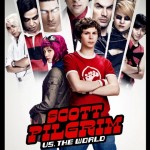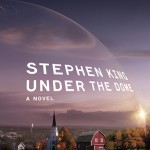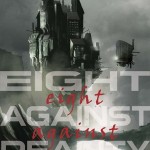written by David Steffen
I’ve said before and I’ll say it again, the number one way to improve your own writing is to read and critically evaluate other people’s writing. You don’t have an emotional attachment to their work as you do to your own. By learning to examine their work with a cold eye, you can learn what you like and don’t like in a story. Critiquing is a skill which is just as much based on social interaction as it is with prose examination. I’ve read critiquing advice elsewhere, which includes such statements as “don’t critique the critiquer” and “don’t rewrite the story for the author”, but here I have categorized and prioritized critiquing advice into larger categories, and split it between “how to critique” and “how to be critiqued”, as well as a couple of general statements.
I list them as rules here, but of course no one will be enforcing them but yourself. You can think of them as guidelines, if you like, but I do think that your critiquing will be more happy and productive, both for giving and receiving critiques, if you follow these guidelines.
How to critique
6 simple “rules”. Of course, there’s no one enforcing these, so there’s not really rules, but more guidelines of etiquette. I think your critiquing relationships will be much happier and more productive if you keep these in mind.
1. A Critique Should Help the Author
Bottom line, and without exception, the primary purpose of writing a critique should be to help the author. Anything that interferes with this should be avoided. I know, I suggested above that you should critique to improve your own skills, and that’s good too, but you can do that part while reading only, not writing critiques. When you write the critiques themselves, that is where these guidelines come into play. All of the other rules tie into this, the most important of all.
2. Don’t be a Dick
Resist the urge to compose nasty, antagonistic responses to a story, no matter how clever you think you are. If you feel a snark coming on, write a quick blog post to get it out of your system. No matter how little you liked the story, a real person wrote it. If you get your jollies off of trying to crush newbie writers’ fledgling hopes, you are in the wrong place. Writers have enough negativity to deal with, bearing the weight of all the rejections piled on them by editors (I’m not complaining about editors, they reject most submissions because they can’t buy everything, it’s just the way the system has to work), and they need anything but another source of negativity.
This ties into Rule #1, because a nasty, abusive response to a story does not help the author. By all means, tell the author, in detail, what you didn’t like about their story, but take a moment to consider how you want to say it. Keep your comments about the story itself, not about the author.
3. This is Not Your Story
Your objective as a critiquer is not to rewrite the story based on your own vision. Remember that this is not your story. Do NOT tell them to write a different story. Do NOT try to rewrite the story for them–I’ve actually received some critiques which literally rewrote a story from beginning to end for me, which is the farthest thing from helpful. Do NOT try to make their style fit your style. Your job is not to make it the best story you can write, but to make it the best story THAT story can be.
This ties into Rule #1, because if you try to rewrite the story yourself, then it is no longer the author’s story. Trying to do the author’s job for them is not helping the author.
4. Don’t be Afraid to Say What You Think
For a worthwhile critiquing relationship, it is your responsibility as a critiquer to express how you actually feel about the story. If you don’t feel comfortable with this, then you’re not ready for critiquing. The way I figure it, if I want to be certain of positive comments, I’ll share a story with my mom. If I want to get feedback that will help me improve the story, I’ll ask someone for a critique. Now, that doesn’t mean that you’re not allowed to express positive comments, only that all of your positive comments should be sincere. And always keep in mind Rule #2.
This ties into Rule #1, because a critiquer who is afraid to point out what they see as flaws in a story is not of much use. If the author asks for a critique, then they are asking for honest feedback, even if it is not positive.
5. Explain
Positive or negative, whatever you do, be specific, explain what you mean. “This story was great” or “This story was terrible”, neither one is particularly helpful, unless you go into more detail. You could say you liked the strong characters, or that you disliked the ending because it felt too improbable. You could say you thought the opening line was hilarious, or that the 2nd person narration was distracting. Just get specific (always keeping Rule #2 in mind). The worst of all vague comments is along the lines of “the writing could use some work.” If you think that’s the case, explain why. For instance, the sentence structure could not vary enough, the protagonist’s name is used too often, or pronouns are often used in a way which makes the antecedent unclear.
This ties into Rule #1, because vague comments are difficult to translate into actual story changes. Take the effort to convert vagueries into specifics, and your critique will have more effect.
6. Find the Good and the Bad
When you’re reading a story for critique, there may very well be tons of negative things you want to say, and as Rule #3 says, you ought to say them. But critiques don’t have to be all bad news. If there are aspects of the story that you liked, you should say those too. Don’t make up things that you like, just seek them out. Starting the critique off with positives and shifting to negatives seems to work pretty well; it establishes a set of story aspects that you don’t think need to change, giving a foundation for any future suggested changes to be built upon.
This ties into Rule #1, because it’s just as important for the writer to know what people liked as what they disliked. This way they can make more informed decisions about what to change and what to leave unchanged. Also, if a particular person always gives unrelentingly negative critiques, the writer may feel bad and may just stop sharing stories with them. By mixing in positive comments, you help maintain a balance with the writer, and maintain a happy critiquing relationship.
How to be critiqued
Some of these rules will be familiar, but seen from the other perspective
1. A Critique Should Help the Author
Yup, the same Rule #1, except in this case, the author is you. You can’t control what kind of critiques you will receive, but you can control how you react to them.
2. Don’t be a Dick
Not every critiquer who reads your work is going to follow any kind of etiquette. I like to use critique forums, but one drawback of them is that there is no entrance exam. Most people are generally trying to be helpful, but the occasional person is just a troll, plain and simple, trying to piss off as many people as they can manage. They may resort to personal insults, or may gleefully try to rip your story apart in the snarkiest way possible. Hopefully this won’t happen too often, but it will happen, and you need to keep your temper when you react. If something really gets you riled up, sometimes it’s better not to react at all: Don’t feed the trolls. Trolls generally act trollish because they want attention, and by responding with rants and raves, you are encouraging their behavior. If you do react, be polite, even though they don’t deserve it. If you can manage, you might just want to say something extremely short like “Thanks for reading and commenting.” If you think the person stepped way over the line, you might consider saying something very simple like “please direct your comments about the story, not about me,” but in general, it’s probably best to just keep quiet.
This ties into Rule #1 for a couple of reasons. First, it may affect other people’s opinions on the forum. If you fly off the handle and act like a troll in response to a nasty critique, then this may affect how likely people will be to read your stuff. Second, it’s just a waste of your energy and attentions. Trying to launch a writing career is generally a very demoralizing business, trying to stay afloat above the constant stream of form rejections. If you post in response to a troll, then you’ve already spent more energy than the communication is worth. It’s best to just move on.
3. This is Your Story
As you read critiques, remember that this is your story, not theirs. Of course you should fix outright grammar/spelling/continuity errors. But you shouldn’t follow any other advice without carefully considering it first. If a critiquer doesn’t like the ending, that doesn’t mean you have to change it. You’ve still gained something by learning how the ending might not to appeal to some people. This is still valuable information.
This ties into Rule #1 because you are the author, and the story is based on your vision. If they offered comments with good intentions, then they have provided a valuable service, but that does not mean you are obligated to follow their every whim. If you follow every suggestion blindly, it will become a story by committee, with all the appeal diluted to the equilibrium of the common vote. It’s good to get opinions from people with a variety of tastes, but if you feel the need to follow all of them, the result will be a bland mishmash, not the gleaming story you hope for.
4. You Don’t Always Need to Say What You Think
It’s the critiquer’s responsibility to say what they think, but that’s not true of the writer. What do you do if someone says a comment which you think is totally incorrect, maybe pointing out an aspect of the story that they see as a flaw, but you see as a strength? You don’t need to tell them you disagree, or that you’ll be disregarding their suggestion. This ties in closely with #3. You won’t be following every person’s advice, but you don’t need to point this out to them, and you don’t need to tell them where their critique is wrong.
This ties into Rule #1, because if you are constantly telling critiquers that you are not going to take their advice, they may come to the conclusion that their critiques are not being taken seriously, that you do not consider them valuable. And trying to convince a critiquer that their critique is wrong is a futile effort–critiques are opinions, not facts, and so they can’t really be wrong. They can just be wrong for your story.
5. Don’t Explain (Unless…)
Imagine that you’ve written a very complicated story, with a complicated plot, and a complicated setting. A critiquer responds and says that they just plain didn’t understand what was happening at any given time. They may ask you to explain. In general, it makes more sense not to explain.
This ties into Rule #1 because, when a story gets published, the reader generally does not have a direct line to the author to explain the parts they didn’t understand. The text must speak for itself, and if it doesn’t do so sufficiently, then the text itself may need to change. If the text can’t make sense without author’s explanation, then more work may need to be done to improve the story’s clarity.
That being said, there are times when explanation may be worthwhile. Using the example above about the critiquer not understanding what’s happening. If you want to make the plot possible to understand, but you’re not sure how, then it might be worthwhile to explain, to see if the critiquer has any ideas for how to bring your intended ideas out in a way that’s more clear to the reader.
General
And, just a couple things that you can keep in mind that don’t tie in very well with the previous categories.
1. Writing Skill is not Critiquing Skill
Although writing and critiquing are very closely related, skill in one does not imply skill in another. A great writer may not have sufficient practice in critiquing to pick apart how someone else’s story could be improved. And someone who has developed great skill in picking apart aspects of a story for critique may not have figured out how to fix these flaws, only how to spot them. When someone critiques your work, your instinct may be to weight their advice based on their publication history, but this is a bad instinct. Likewise, when critiquing someone else, you may be tempted to ignore flaws in their story if they are famous but, again, this defeats the purpose of critiquing at all. Each critique and each story should be taken on its own merits, regardless of the writing skill or publishing history of the person in question.
2. Turnabout
One way to help yourself follow these rules is to encourage critique exchanges, rather than one-sided critiques. In this way, you can both better learn where the strengths and weaknesses of the other person’s stories tend to lie, and you’ll be much less tempted to be a jerk if you know that the other person will have the opportunity to give you the same treatment.
3. Where to Critique?
Okay, so this isn’t so much a guideline, as a question that you might have asked yourself, that I will answer briefly.
Find a local in-person writer’s group. Most metropolitan areas will probably have one or more. My local speculative fiction writers group, for instance, is MinnSpec.
The easiest way to find people to critique you is to go to a critique forum like Baen’s Bar or Critters.
A bit more involved, and with more unpredictable returns is to arrange your own group, or just exchange critiques with individuals, perhaps via email. Stop by the forum of a writing forum or magazine forum, like the Writers of the Future forum, or Hatrack River.






![s551815767_143845_1164[1]](https://www.diabolicalplots.com/wp-content/uploads/2009/08/s551815767_143845_11641.jpg)

